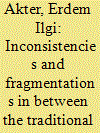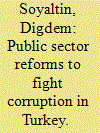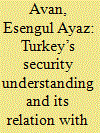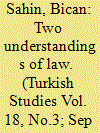|
|
|
Sort Order |
|
|
|
Items / Page
|
|
|
|
|
|
|
| Srl | Item |
| 1 |
ID:
154940


|
|
|
|
|
| Summary/Abstract |
A strong sense of victimhood, a discourse of social suffering, and complementary bodily performances, which mobilize rancor, resentfulness, and revengefulness, are fundamental elements of Turkish-Islamist ideology. This article discusses the political dynamics and implications of such assertions of victimhood in the Turkish context. To underscore these dynamics, it analyses the role of the logic of pain in the subject formation of Turkish-Islamist identity and how this logic has been revitalized by constitutive and hegemonic social imagination, and circulated and intensified by a reactionary mood. Additionally, it aims to expose how this reactionary mood profoundly depends on contradictory subjectification processes, which simultaneously involve mobilization of feelings of impotency, non-responsibility, self-pitying, and sublimation of power. This subject formation opens the way for identification with authoritarian figures in the Turkish case.
|
|
|
|
|
|
|
|
|
|
|
|
|
|
|
|
| 2 |
ID:
154930


|
|
|
|
|
| Summary/Abstract |
Turkey’s current slide to authoritarianism creates a puzzle for democratization theory, as it challenges the commonly accepted relationship between wealth and democracy. There is a large consensus in the democratization literature that a robust civil society, a growing middle class, and high GDP per capita create a conducive environment for an authoritarian country to democratize and make it harder for democratic countries to turn authoritarian. Prominent scholars of Turkish politics used these arguments when conceptualizing Turkey’s liberalization and the checkered democratization process in the post-1980 period. Yet, despite positive economic growth, a flourishing civil society, and a rising middle class, Turkey drifted toward a competitive authoritarian regime during the past five years. The article addresses this puzzle and discusses how the Justice and Development Party (Adalet ve Kalkınma Partisi, AKP) co-opted Islamic civil society organizations and attached conservative businessmen to the state through crony-relations, thereby stripping these societal forces from their democratizing qualities.
|
|
|
|
|
|
|
|
|
|
|
|
|
|
|
|
| 3 |
ID:
154942


|
|
|
|
|
| Summary/Abstract |
This paper addresses the paradoxes and challenges faced by tasavvuf musicians as they engage with the ‘field of tradition’ in Turkey. It shows the incoherent nature of this field and how the conservative cultural turn since the early 2000s contributes to its fragmentation. This period is particularly relevant, as it is considered a period of traditionalization, when society became more exposed to a new, traditionalized culture industry. Hence, the paper suggests that tasavvuf music, emically labeled as ‘tradition’, has been integrated into the period of traditionalization; yet, its practitioners show inconsistences and conflicting discourses in their relation with the traditionalization.
|
|
|
|
|
|
|
|
|
|
|
|
|
|
|
|
| 4 |
ID:
154941


|
|
|
|
|
| Summary/Abstract |
Through a close reading of hitherto untapped archival sources, this article looks at the 1939 Turkish elections and argues that through extensive denunciation, petitioning, and an unofficial pre-election procedure, provincial urbanites had local candidates selected as MPs while discarding candidates proposed by Ankara. Petitioning and clandestine but extensive mobilization from below had an impact on state–society relations, state policies, and politics. Petitions, denunciations, and their processing constituted a communicative and essentially political space that facilitated state–society interaction and served as a means of empowerment of social actors at the local level to negotiate and modify the policies of an authoritarian single-party regime. In turn, the state appeared pragmatic in its attempt to boost its legitimacy through considering societal demands, although, in doing so, it demonstrated class, ethnic, educational, and religious biases. Nevertheless, in this way the regime became more amenable to popular participation and its policies to manipulation by society.
|
|
|
|
|
|
|
|
|
|
|
|
|
|
|
|
| 5 |
ID:
154935


|
|
|
|
|
| Summary/Abstract |
This article examines the practical application of legal reforms to fight corruption in Turkey, focusing on three policy sectors: civil administration, public finance management and public procurement. Facing increasing pressure, incumbent governments have adopted international anti-corruption norms and programs in the last two decades. However, the adoption and adaptation of formal institutions tends to remain decoupled from informal behavioral practices, thereby curbing the effectiveness of Europeanization in the Turkish public sector – albeit to varying degrees. The policy comparison of this article shows that external anti-corruption efforts, especially those initiated by the EU, can help domestic actors to address the problem of decoupling when certain domestic factors are present.
|
|
|
|
|
|
|
|
|
|
|
|
|
|
|
|
| 6 |
ID:
154932


|
|
|
|
|
| Summary/Abstract |
Turkey’s accession to the European Union (EU) is one of the most controversial cases in its enlargement policy. Both external and domestic factors complicate its accession, bringing forth questions on geographical, cultural borders of Europe as well as the limits of EU’s institutional capacity. While Turkey’s accession seems to be farther away, it is, nonetheless, functionally integrated to the EU in multiple ways, ranging from trade, common foreign and security policy, justice and home affairs to energy cooperation. It is, therefore, critical to assess whether alternative modes of integration are possible for Turkish–EU relations, going beyond formal membership. To do so, the paper draws upon the in-depth interviews conducted with Turkish and EU officials in 2013, 2015 and 2016. The paper evaluates the degree of differentiated integration between Turkey and the EU, and assesses the trajectory of this functional integration in related policy areas and proposes multiple new avenues to further this cooperation.
|
|
|
|
|
|
|
|
|
|
|
|
|
|
|
|
| 7 |
ID:
154938


|
|
|
|
|
| Summary/Abstract |
While the end of the Cold War challenged the classical understanding of national security in Europe, Turkey continued to follow a national security-centered and confrontational foreign policy during the 1990s due to its internal and external security problems. Although this created important differences in security understandings and policies between Turkey and the European Union (EU), Turkey continued to seek EU membership during the 1990s. The goal of this paper is to answer why Turkey was willing to join the EU in the 1990s despite its difficulty in balancing its relations with the EU with its security problems. The main conclusion of the paper is that Turkey’s eagerness to join the EU during the 1990s can be explained by both the perception of EU membership as the most appropriate and desired policy for Turkey and Turkey’s eagerness to ensure its political and security objectives.
|
|
|
|
|
|
|
|
|
|
|
|
|
|
|
|
| 8 |
ID:
154943


|
|
|
|
|
| Summary/Abstract |
The purpose of this article is to explore the consequences of following two different understandings of law for the consolidation of rule of law and democracy, provided by Friedrich von Hayek and Carl Schmitt. The context within which this exploration is carried out is the political scene of Turkey since December 2013. It is first argued that while the Hayekian understanding of law strengthens the principle of rule of law and democracy, the Schmittian understanding undermines them. Secondly, it is argued that Justice and Development Party government in Turkey has followed the Schmittian understanding of law at least since December 2013 and this in turn has undermined the rule of law and democracy in Turkey.
|
|
|
|
|
|
|
|
|
|
|
|
|
|
|
|
|
|
|
|
|